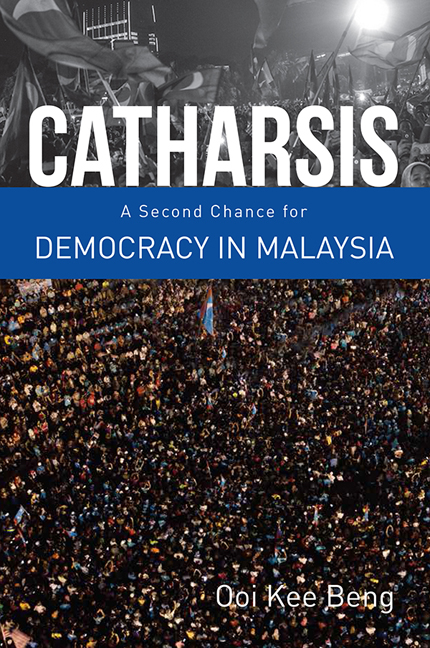Book contents
- Frontmatter
- Contents
- Foreword
- 1 Introduction – Malaysia's Future Is Redeemed
- Before Pakatan Harapan
- Before 9 May 2018
- With Mahathir at the Helm
- 31 One Thing Is Certain—There Will Be More Amendments to the Constitution
- 32 The More Things Change, the More Things May Actually Change
- 33 Did Merdeka Liberate or Create Malaya?
- 34 Interview with Nurul Izzah Anwar: Rebuilding a Nation Long Divided
- 35 The Diminishing of Humans Through Identity Politics
- 36 The Art of Dismantling Cultural Pluralism
- 37 No Need to Let Bigots Dictate Policy
- 38 What the Penang Floods Say About Malaysian Politics (and It's Not Just About Climate Change)
- 39 This is the Moment of Truth for Malaysia's Race-based Politics
- 40 We are Equal Only Through Our Vote
- 41 Why the Opposition Has a Shot at Toppling the Barisan Nasional with Mahathir at the Helm
- 42 Spiralling Back towards Reformasi
- 43 Individual Freedom Is a Matter of National Survival
- 44 Why Meet the Twenty-first Century with Twentieth Century Mindsets?
- 45 A Final Quarrel between a Repentant Grandfather and Oldfashioned Self-absorbed Parents
- 46 Outraged Enough to Go Vote or Cynical Enough to Stay Home?
- Beyond 9 May 2018
- About the Author
35 - The Diminishing of Humans Through Identity Politics
from With Mahathir at the Helm
Published online by Cambridge University Press: 12 February 2019
- Frontmatter
- Contents
- Foreword
- 1 Introduction – Malaysia's Future Is Redeemed
- Before Pakatan Harapan
- Before 9 May 2018
- With Mahathir at the Helm
- 31 One Thing Is Certain—There Will Be More Amendments to the Constitution
- 32 The More Things Change, the More Things May Actually Change
- 33 Did Merdeka Liberate or Create Malaya?
- 34 Interview with Nurul Izzah Anwar: Rebuilding a Nation Long Divided
- 35 The Diminishing of Humans Through Identity Politics
- 36 The Art of Dismantling Cultural Pluralism
- 37 No Need to Let Bigots Dictate Policy
- 38 What the Penang Floods Say About Malaysian Politics (and It's Not Just About Climate Change)
- 39 This is the Moment of Truth for Malaysia's Race-based Politics
- 40 We are Equal Only Through Our Vote
- 41 Why the Opposition Has a Shot at Toppling the Barisan Nasional with Mahathir at the Helm
- 42 Spiralling Back towards Reformasi
- 43 Individual Freedom Is a Matter of National Survival
- 44 Why Meet the Twenty-first Century with Twentieth Century Mindsets?
- 45 A Final Quarrel between a Repentant Grandfather and Oldfashioned Self-absorbed Parents
- 46 Outraged Enough to Go Vote or Cynical Enough to Stay Home?
- Beyond 9 May 2018
- About the Author
Summary
Who am I?
A simple question to ask oneself and yet, no simple answer suggests itself. As long as the issue is about the singular person, it appears to be but a psychological and philosophical quandary.
Ask it in the plural and we approach what may be the key question of our times. It becomes a scrutiny of the human situation today. It becomes sociological, and it becomes highly political.
Who are we?
Now, the ‘we’ is the issue. In both cases, the answer can never be adequate. Much must be left out. A life is always unimaginably more than a biography can be.
In inquiring about myself, I would try to include as much as possible in my answer and in effect, I end by leaving the answer purposefully unfinished and properly tentative.
When the query is about the collective, ‘Who are X?’; ‘Who are Chinese?’, ‘Who are men?’, ‘Who are Malaysians?’, ‘Who are human beings?’, one is immediately drawn to seek a neat answer that captures the essence of the collective.
This latter cognitive habit is a serious problem and whatever its roots, the fateful fault lies in mistaking denotations for connotations.
When answering the self-query, I imagine different streams of experience from my past, always too many and disparate to mention. But in answering what collectives I presumably belong to, I seek to simplify instead and try to give as basic and as diminished a definition as possible.
Giving tentative, and even poetic, answers to questions about identity seems to me to be the only rational way to go. After all, is a Chinese today what a Chinese was a century ago? Is being a man today the same in Malaysia as in Thailand? Is being a man the same as being one in 1943 or even tomorrow?
Should one expect an answer about identity to be anything other than an exploratory one, then one is seeking power, and is propounding and prescribing definitions that are self-serving.
Let me illustrate this cognitive flaw, or cunning, another way.
Whenever we marry, we join fortunes with more than just a person. Whenever we make a friend, we connect with more than just an individual. This is true whether the other person belongs to our collective or not.
- Type
- Chapter
- Information
- CatharsisA Second Chance for Democracy in Malaysia, pp. 133 - 135Publisher: ISEAS–Yusof Ishak InstitutePrint publication year: 2018



